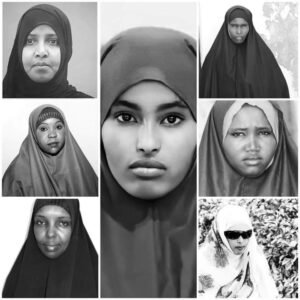Women, Warfare, and Wiles: A Malignant Nexus
In recent months, a deeply concerning trend has emerged in Somalia—a nation already beset by protracted conflict and insurgency. Women are increasingly becoming active participants in the machinations of Al-Shabaab, the extremist group that has long plagued the region. A slew of recent court cases has revealed a multifaceted involvement extending beyond mere logistics and material support; women are now involved in espionage, propaganda dissemination, and even assassination plots.
Speaking under the condition of anonymity, Amina, a Mogadishu resident, recounts how her younger sister was lured into the murky world of extremism. ‘We never saw it coming,’ she says, visibly shaken. ‘My sister was bright, and we had dreams for her. But she started changing, and before we knew it, she was gone.
The Honey Trap: Fatal Attraction as a Tactic
One particularly insidious strategy employed by Al-Shabaab is the so-called ‘honey trap’. Women are coerced or persuaded to date soldiers and government employees, forming relationships built on trust and intimacy, only to culminate in targeted assassinations. “It’s a disturbing escalation in tactics,” warns Dr. Farhiya Abdi, an expert on extremism and gender dynamics in Mogadishu.
Last month, Ibrahim Hilowle Hussein, the head of Somalia’s National Intelligence and Security Agency (NISA) for Dolow district in Gedo region, was tragically killed by his newlywed wife, who has confessed to the killing and is currently in custody, suspected of links to Al-Shabaab.
Gender Dynamics and Strategic Advantage
What makes this development particularly worrisome is how it taps into the gender dynamics and societal norms of the Somali community. Women are often perceived as less likely to be involved in militant activities—a stereotype that Al-Shabaab is keen to exploit. By recruiting women, the group adds a troubling new dimension to its operations, challenging security forces.
The Rising Recruitment and Its Social Cost
Women like Safia Isse Arwaah and Deeqa Mohamed Sabriye serve as cautionary tales, illustrating how personal grievances and economic hardship can push individuals towards extremist ideologies. The social fabric of Somalia is undergoing a detrimental transformation, posing a grim new concern for families: the recruitment of their daughters and wives into terrorism.
Notable Cases
Safia Isse Arwaah, 28, was arrested in October 2019 by the Federal Government’s security agencies. She joined Al-Shabaab in 2018 following two failed marriages. She has been sentenced to 15 years in military prison for roles that include storing and transferring weapons such as pistols, grenades, and AK-47s, as well as explosive belts.
Deeqa Mohamed Sabriye, 43, was arrested in December 2020 and has been part of the organisation since 2016 in Lower Shabelle. Earning a monthly salary of $150, Sabriye was responsible for storing and delivering military equipment including uniforms, weapons, and Somali military insignia. She has also been sentenced to 15 years in military prison.
Fatima Mohamed Hussein, 28, hailing from Amara in the Mudug region, was arrested in 2022 from a house in the district of Karaan where an F1 hand grenade and pistols were found. Assisted by her estranged husband, she was involved in storing weapons and spying on soldiers. She was sentenced to 15 years in military prison.
Basra Mohamed Ali, 32 years old, was arrested at the Livestock market in the Hilwaa district in August 2018. Her late husband, Liban Abdikarin (Liban Jaraye), was a member of Al-Shabaab and died in an explosion. After his death, a man named Khalid recruited Basra into the group. She was sentenced to five years in military prison for storing and transferring weapons.
Basira Abdi Mohamed, a 26-year-old blind woman, was previously working in the Office of the Coordinator of Disabled People in Banadir Region. She was appointed by Abdirahman Omar Osman (Eng Yarisow), the then Governor of Banadir Region. Basira has been implicated in an explosion at the Banadir regional hall in July 2019 which resulted in multiple fatalities, including Eng Yarisow.
Hawa Osman Abdi was recently brought before the Armed Forces Court and stands accused of financing Al-Shabaab and propagating the extremist ideologies of its media wing, Al-Kata’ib. Hawa admitted to having been radicalised via social media after returning from Saudi Arabia in 2021. She also posed as a young woman seeking relationships, with the intent of gathering personal details about her acquaintances and subsequently passing sensitive information to Al-Shabaab.
Farhiya Hassan, 38-year-old, a mother of six, was arrested in the Netherlands in early 2022 and later extradited to the United States. She was convicted of having links with Al-Shabaab and of sending approximately $3000 to the group over a span of three years. She was sentenced to three years in prison.
Human Rights Concerns
The evolving recruitment strategy raises serious ethical questions. Security agencies face the challenging task of balancing human rights concerns while disrupting activities that compromise national security. Accusations of gender profiling could end up sidelining the real issue here: protecting human lives,” says Dr. Khadar Ahmed, a human rights advocate in Mogadishu. Standing outside the government building where he works, Dr. Khadar Ahmed is unequivocal: ‘We can’t lose our humanity in the process of fighting extremism. Women or men, we should never compromise on human rights.
The Security Quandary
This evolving recruitment strategy presents a considerable challenge for security agencies. They must navigate the treacherous waters of human rights concerns while disrupting dangerous liaisons that undermine national security. Accusations of gender profiling could potentially arise, placing these organisations in a difficult position.
We spoke with Sergeant Idil Yusuf of the Somali National Army, who admitted the challenge is ‘like walking on a tightrope.’ She sighed, looking over at her colleagues. ‘We have to be right 100% of the time. They only have to be right once.”
Security Measures
While Al-Shabaab increasingly turns to women for its operations, Somalia’s security agencies remain highly vigilant. They are committed to disrupting the intricate networks set up by the extremists to compromise national security.
International Context and Countermeasures
Though the focus here is Somalia, the ‘feminisation’ of terror tactics is an alarming global trend, appearing in conflicts from the Middle East to Southeast Asia. Security agencies in Somalia remain vigilant, and while some countermeasures are in place, a multi-pronged approach involving social programmes and targeted intelligence operations is needed. “A multi-pronged approach involving social programmes and targeted intelligence is the need of the hour,” advises the Somali National Army. anti-terrorism expert Sergent Idil Yusuf.
Concluding Thoughts
The use of women in terror operations by Al-Shabaab should serve as a wake-up call for all—governments, security agencies, and civil society alike. The erosion of the stereotypical terrorist profile means that no one can afford to be complacent. Vigilance, comprehensive social programmes, and targeted intelligence operations are the need of the hour. But it also necessitates a societal shift; a move away from the perception that women are passive actors in conflict situations. Only through a multi-faceted approach can we hope to counter this insidious new strategy and secure the future of the nation.
As the sun sets over Mogadishu, families gather around their dinner tables. But the empty seats are a poignant reminder of the daughters, sisters, and mothers lost to extremism. The impact of this issue extends from national security to deeply personal losses. The fight against extremism is not just a matter of security but a struggle for the soul of the community.
About the Author:
With a decade of experience working alongside government institutions, Hanad Mohamed is not only a seasoned journalist but also a staunch rights activist. Founder of Halqabsi News, a trusted source for critical analysis and ground-breaking stories out of Somalia. Beyond his reporting, Hanad is a skilled content creator and communications specialist.















